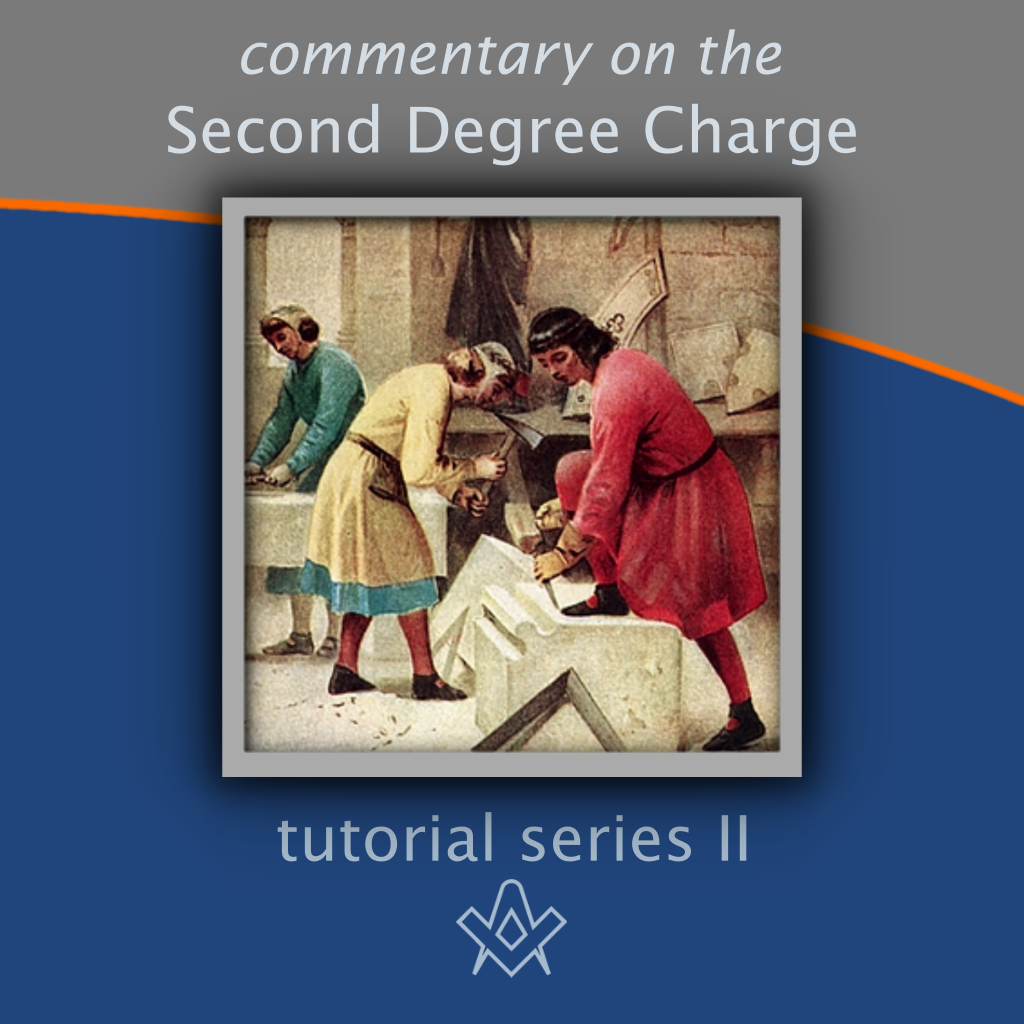Following on from the commentary I wrote on the First Degree Charge which is in the July 2021 issue of The Square Magazine, I now present to you my commentary on the Second Degree Charge.
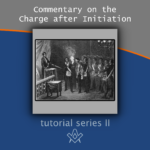
Commentary on the Charge after Initiation
A more detailed explanation in order for us to understand the Charge after Initiation
more….
In my first commentary, I wrote about how Freemasonry was born out of the medieval Stonemasons Guilds. How the apprentice would live in the Master’s house and learn, not only the skills of operative masonry but the values of family life and good citizenship in order to be respected both in the community and in the workplace. To be a moral man.
In the second degree we learn about being an educated man. Skilful, not only in the Craft itself but also how to manage others.
Video Presentation
Bro. AB now that you have advanced to the Second Degree, we congratulate you on your elevation. It is unnecessary to recapitulate the duties which, as a Freemason, you are now bound to discharge, or enlarge on the necessity of a strict adherence to them, as your own experience must have established their value.
Right at the beginning of this Charge the candidate is reminded of the first degree Charge which went into detail of how a Freemason should act in a comprehensive list of situations. It also gives credence to the Craftsman in validating the value of their own experiences.
Your past behaviour and regular deportment have merited the honour which we have conferred and in your new character it is expected that you will not only conform to the principles of the Order but steadily persevere in the practice of every virtue.
The Charge acknowledges the fact that the Craftsman has acted as a ‘moral man’ and encourages the Craftsman not only to continue to do so but also to grow and develop himself to be the best person he can be and conform to the principles of brotherly love, relief and truth or in more modern terminology, integrity, respect, friendship and charity.
The study of the liberal arts, which tends so effectually to polish and adorn the mind, is earnestly recommended to your consideration, especially the science of Geometry which is established as the basis of our Art.
The purpose of the second degree is to influence the candidate in his personal development. To be the educated or intellectual man. To study the ‘trivium’ (grammar, rhetoric, logic) and ‘quadrivium’ (arithmetic, geometry, music, astronomy) that is language and the use of language and calculation for these are the basic skills of an educated man.
It is in the second degree that we learn about the symbolism of geometry in Freemasonry and its importance. We learn about ‘square conduct, level steps and upright intentions’.
As the solemnity of our ceremonies requires a serious deportment, you are to be particularly attentive to your behaviour in our regular assemblies; you are to preserve our ancient usages and customs sacred and inviolable and induce others, by your example, to hold them in veneration.
For our ritual to be effective there must be an attitude from all participants in Lodge which is respectful. Respectful not only to the participants of the ritual but also to the occasion. The candidate will only go through the ceremony as the principle player once so all those in the Lodge room must show that respect which is due. Attitude affects behaviour which affects the attitude and behaviour of others.
The laws and regulations of the Order you are strenuously to support and maintain. You are not to palliate or aggravate the offences of your Brethren, but in the decision of every trespass against our rules, judge with candour, admonish with friendship, and reprehend with mercy.
In both the first and second degree the candidate took vows of fidelity that is to say they made certain promises to be faithful and show loyalty to the constitutions of Freemasonry. This charge goes onto say that should a Brother break those constitutional rules the Craftsman should not disguise the seriousness of the offence or make it worse. He should be open, honest, friendly and forgiving.
As a Craftsman, in our private assemblies you may offer your sentiments and opinions on such subjects as are regularly introduced in the Lecture, under the superintendence of an experienced Master, who will guard the Landmarks against encroachment. By this privilege you may improve your intellectual powers, qualify yourself to become a useful member of society and, like a skilful Brother, strive to excel in what is good and great.
On the Coat of Arms of the United Grand Lodge of England are the words ‘Audi Vide Tace’, the full quote is ‘Audi, vide, tace, si vis viverer in pace’ – meaning: ‘hear, see, hold your tongue if you would live in peace’. Good advice to all Freemasons but in particular as an Entered Apprentice. In the second degree the Craftsman is invited to take part in Masonic discussions but only under the guidance of an experienced Mason so that none of the Masonic secrets are inadvertently betrayed.
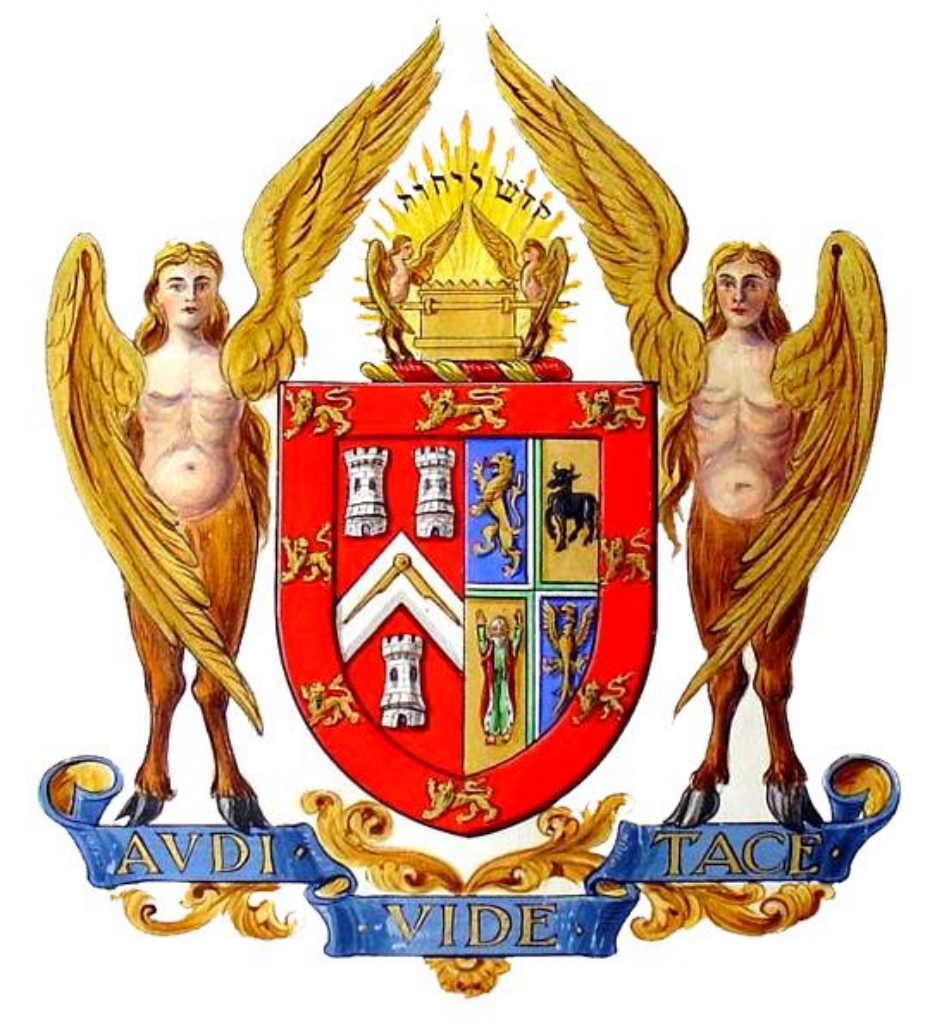
The Coat of Arms of the United Grand Lodge of England upon which are the words ‘Audi Vide Tace’
This is in line with the ethos of the second degree, that of being an educated or intellectual man. By taking part in such supervised discussions the Craftsman will become aware of the moral teachings of Freemasonry and the importance of self-development. He will become the best version of himself.
You are to duly honour and obey all regular signs and summonses, given and received. You are to encourage industry and reward merit, supply the wants and relieve the necessities of Brethren and Fellows to the utmost of your power and ability, and on no account to wrong them, or see them wronged, but timely to apprise them of approaching danger and to view their interests as inseparable from your own.
As in the first degree the Craftsman is reminded of his duties to obey all lawful signs and summonses sent to him by his Lodge.
A Craftsman is likened to a middle management role in the early guilds and in any middle management role the way to get the best out of people is by encouragement and reward, to look after your colleagues and be a person that they can approach in time of need.
To watch their backs and be supportive as long as in doing so you do not break any moral, civil or criminal law. For Freemasons have one thing in view that is to help each other be the best version of themselves.
Such, my Brother, is the nature of your engagements as a F.C. and these duties you are bound by the most sacred ties to observe.
And so we have the behaviour expected of a Craftsman as laid down in the Ancient Charges. By taking that vow of ‘fidelity’, the most sacred of promises, the Craftsman maintains that he will do his very best to support his colleagues and set a course of personal development that takes him on a journey to being the best person he can be, a Master Mason.
Second Degree Source Text: Standard Taylors Workings
Article by: Stephen J. Goulding
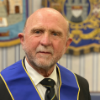
Stephen was initiated into Freemasonry in 1978 in Tylney Lodge No. 5856 (UGLE). He was Master in 1989 & 2004.
He was Master of the Lodge of Union 38 (UGLE) in 2018. He is also a PZ in the Holy Royal Arch and PM in the Mark Degree.
Stephen served 30 years in the Metropolitan Police Service (London, England) before going into education in 2000, where he became a college lecturer and a mentor for both the college and the University of Greenwich (London, England). Now retired, he teaches Tai Chi and Qigong in the community.
Facebook: Steve Goulding-Tai Chi West Sussex–Chi at Chi
Recent Articles: in this tutorial series
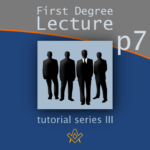 William Preston (1742 – 1818) gives his lectures in the form of a Catechism – questions and answers - and broken down into seven bite size chunks. This article is the first of the seven part series presented by Steve Goulding |
 William Preston (1742 – 1818) gives his lectures in the form of a Catechism – questions and answers - and broken down into seven bite size chunks. This article is the first of the seven part series presented by Steve Goulding |
 William Preston (1742 – 1818) gives his lectures in the form of a Catechism – questions and answers - and broken down into seven bite size chunks. This article is the first of the seven part series presented by Steve Goulding |
 William Preston (1742 – 1818) gives his lectures in the form of a Catechism – questions and answers - and broken down into seven bite size chunks. This article is the first of the seven part series presented by Steve Goulding |
 William Preston (1742 – 1818) gives his lectures in the form of a Catechism – questions and answers - and broken down into seven bite size chunks. This article is the first of the seven part series presented by Steve Goulding |
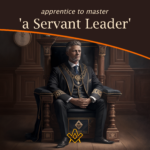 Apprentice to Master, “a Servant Leader”. Freemasonry is a learning platform used to improve a lifestyle which is morally, educationally and spiritually sound. To guide a person through life in order to be the best they can be. A Master, or ‘Servant Leader,’ develops those people in their care. They are someone who can guide others using the principles of Freemasonry - By Stephen J. Goulding |
 William Preston (1742 – 1818) gives his lectures in the form of a Catechism – questions and answers - and broken down into seven bite size chunks. This article is the second of the seven part series presented by Steve Goulding |
 William Preston (1742 – 1818) gives his lectures in the form of a Catechism – questions and answers - and broken down into seven bite size chunks. This article is the first of the seven part series presented by Steve Goulding |
 Commentary on the Third Degree Charge The Third Degree Charge invites the candidate to reflect on his life as both a ‘moral’ and ‘educated’ man, and to contemplate on what may be missing in his life. The ‘genuine secrets of a Master Mason’. |
 Commentary on the Second Degree Charge In the second degree we learn about being an educated man. Skilful, not only in the Craft itself but also how to communicate and manage others. This Commentary looks at the second degree charge in detail. |
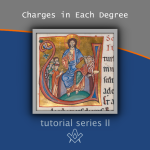 The ‘Old Charges’ have come down to us, containing the rules and regulations by which Lodges should be run and the moral and social standards to which each Lodge member should adhere. |
 Steps to the Making of a Master. The symbolism of each step of the winding staircase is to continue your personal development throughout your life, right up to your last breath in this world. |
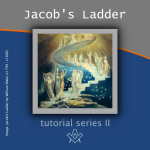 On the First Degree tracing board the most dominant feature is Jacob’s Ladder stretching from Earth to Heaven. Being straight, it is the shortest and quickest way to reach heaven, and being straight you can see the end goal. |
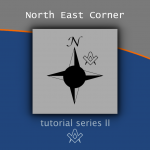 The North East Corner: A Lesson on Charity The ritual of the North East corner is a powerful piece of teaching. Let us examine that piece of ritual more closely; the lesson on charity. |
 When we look at the ritual book the deacons are told to ‘perambulate’ with the candidate. So what does this really mean? |
 The taking of a ‘Vow of Fidelity’. Oaths, Vows and Covenants |
 Morality veiled in allegory and illustrated by symbols A phrase that immediately comes to mind when describing Freemasonry – Morality veiled in allegory and illustrated by symbols. Let us have a look at what this phrase actually means. |
 Officers of the Royal Arch - The Principals The Principals' role in the Royal Arch, representing the pinnacle of spiritual leadership. Their esoteric significance lies in the unity of the three aspects of the divine, emphasizing the importance of harmony and balance in attaining spiritual enlightenment. The Principals embody the ultimate goal of the Royal Arch journey - the realization of divine wisdom. |
 Officers of the Royal Arch - Scribe Ezra Scribe Ezra is portrayed as a crucial figure within the Royal Arch, responsible for interpreting and teaching divine laws. The significance of his role lies in the pursuit of understanding and applying sacred knowledge, emphasizing the transformative power of wisdom when applied to one's life. |
 Officers of the Royal Arch - Scribe Nehemiah Scribe Nehemiah's responsibility within the Royal Arch, is that of preserving the sacred teachings. Scribe Nehemiah symbolizes the importance of maintaining accurate records and upholding the integrity of divine knowledge, thus reflecting the value of safeguarding spiritual wisdom for future generations. |
 Officers of the Royal Arch - The Sojourners The Sojourners, are seekers of truth, their journey symbolizes the spiritual path to enlightenment. Their role in rediscovering lost wisdom highlights the esoteric concept of regaining divine knowledge through perseverance and self-discovery. |
 Commentary on the Charge after Initiation A more detailed explanation in order for us to understand the Charge after Initiation |
 Officers of the Royal Arch - The Janitor The Janitor, is a crucial officer in the Royal Arch. Symbolically, the Janitor represents the guardian of sacred knowledge, ensuring only worthy individuals gain access. This function emphasizes the importance of maintaining spiritual purity and safeguarding the mysteries of the Royal Arch. |
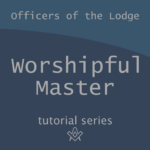 Officers of the Lodge - Worshipful Master Worshipful Master: the highest-ranking officer in the lodge, is the embodiment of wisdom and authority. The Worshipful Master guides the brethren on their spiritual path, representing the divine light that illuminates the Masonic quest for knowledge and self-discovery. |
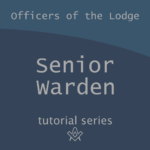 Officers of the Lodge - Senior Warden Senior Warden: embodies the essence of strength and stability within the lodge. As the pillar of support for the Worshipful Master, the Senior Warden symbolizes the fortitude required on our spiritual journey, inspiring us to persevere in the face of adversity |
 Officers of the Lodge - Junior Warden Junior Warden: Ensuring the well-being of the brethren during the lodge's hours of refreshment. Representing the virtue of temperance, the Junior Warden reminds us to find balance in our lives and cultivate moral discipline in our pursuit of truth. |
 Officers of the Lodge - Deacons Deacons: The messengers and intermediaries within the lodge. Representing the communication between the material and the spiritual realms, Deacons symbolize the importance of transmitting knowledge and wisdom as we strive for personal growth and enlightenment on our Masonic journey. |
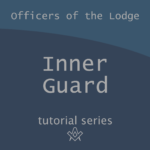 Officers of the Lodge - Inner Guard Inner Guard: Is the first line of defence against unworthy intruders, the Inner Guard represents our inner conscience and the personal responsibility we have to safeguard the integrity of our spiritual journey. |
 Tyler: The significance as the protector of the lodge's secrets and harmony. Tasked with guarding the entrance, the Tyler symbolizes our spiritual and moral boundaries, ensuring only worthy candidates are allowed into the sacred space of Freemasonry's teachings and rituals. |
masonic knowledge
to be a better citizen of the world
share the square with two brothers

click image to open email app on mobile device



